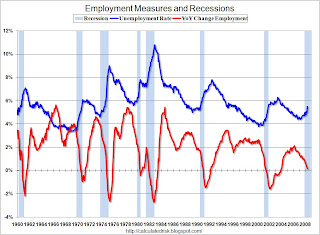May Unemployment rate jumped to 5.5%
According to BLS and WSJ: The U.S. unemployment rate posted its sharpest one-month increase in 22 years last month, suggesting U.S. consumers already facing a housing slump and soaring gasoline prices now confront growing pressure from a weakening jobs market.
The data, which included a fifth-straight drop in nonfarm employment, should take financial-market expectations of Federal Reserve rate increases as soon as this fall off the table.
The below graph shows the unemployment rate and the year-over-year change in employment vs. recessions.
(click to enlarge; coutesy of CR)
Note the current recession indicated on the graph is “probable”, and is not official.
Commodity-Price Scapegoats
Commodity index funds are especially vulnerable politically. They are a big target – reportedly, there is about $260 billion invested in them currently. Among their largest investors are retirement funds for government employees and teachers, which by their very nature are subject to political pressure. For example, the organized labor lobby is already trying to get states to make their funds to stop investing in private equity deals in companies that won't employ union labor.
…
The evidence against the index funds is circumstantial at best: Commodity prices have soared over the same recent period that commodity index funds have rapidly grown. So the index funds must have caused it.
But coincidence isn't causation. And such causation that can be shown to exist actually runs the other way: Rising commodity prices cause the dollar value of commodity index funds to rise, just as rising stock prices would make a stock index fund more valuable. This accounts for nearly half the reported growth in commodity index fund assets this year. But if commodity index funds are such a powerful influence on prices, how can one explain the fact that not all the commodities in the GSCI have risen?
Unlike other commodities buyers, index funds never take physical delivery of commodities to store or consume them. They are investors, not hoarders. They don't divert any supplies from the markets. When their futures contracts near expiration, they sell them and replace them with longer-dated contracts. Thus, once their positions are established, they are perpetually both buyers and sellers in equal proportion.
Bernanke at Harvard: Not the 70s
Bernanke delivered his commencement speech at Harvard today. His speech was not at all inspiring and quite boring actually for such an occasion (notice how many students were yawning in the background).
He echoed similar view as Janet Yellen, that today’s situation is very different from 70s, notably, there is no wage-price spiral and inflation expectation remains low albeit increased quite a bit recently.
Oil and sushi
Sushi is in danger of falling victim to high oil prices after fishing industry groups warned that a third of the world’s long-line tuna fleet – the ships that catch the high-grade tuna used in the Japanese dish – could remain docked this year as soaring fuel costs make fishing unprofitable.
Realities and elusions
A highly recommended piece: David Goldman Bloomberg interview today.
What to take away? 1) More trouble to come for US banks; 2) Asian inflation serious macro concern, the biggest challenge for Asian economies since 1997.
Soros give four reasons for high oil
Soros’ testimony (#2 is the most intriguing one):
First, the increasing cost of discovering and developing new reserves and the accelerating depletion of existing oil fields as they age. This goes under the rather misleading name of “peak oil”.
Second, there is what may be described as a backward-sloping supply curve. As the price of oil rises, oil-producing countries have less incentive to convert their oil reserves underground, which are expected to appreciate in value, into dollar reserves above ground, which are losing their value. In addition, the high price of oil has allowed political regimes, which are inefficient and hostile to the West, to maintain themselves in power, notably Iran, Venezuela and Russia. Oil production in these countries is declining.Third, the countries with the fastest growing demand, notably the major oil producers, and China and other Asian exporters, keep domestic energy prices artificially low by providing subsidies. Therefore rising prices do not reduce demand as they would under normal conditions.
Fourth, both trend-following speculation and institutional commodity index buying reinforce the upward pressure on prices. Commodities have become an asset class for institutional investors and they are increasing allocations to that asset class by following an index buying strategy. Recently, spot prices have risen far above the marginal cost of production and far-out, forward contracts have risen much faster than spot prices. Price charts have taken on a parabolic shape which is characteristic of bubbles in the making.
Zhou says hot money into China exaggerated
Source: China Daily
U.S. Federal Reserve's interest rate cuts have helped increase liquidity, but have also led to rising prices in commodities, Zhou Xiaochuan, governor of the People's Bank of China, said on Friday.



